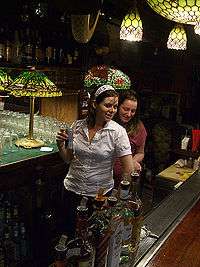Fern bar
Fern bar was an American slang term for an upscale or preppy (or yuppie) bar or tavern catering to singles, usually decorated with ferns or other greenery, as well as such decor as fake Tiffany lamps. The phrase came into common use in the late 1970s or early 1980s.
History

The first fern bar was the original T.G.I. Friday's on the corner of 63rd Street and First Avenue in a neighborhood on the Upper East Side of New York City, where many single young women lived. The founder, Alan Stillman, with a few thousand dollars borrowed from his mother, leased a saloon and remodeled it, converting the ambience to one attractive to young women. It opened March 15, 1965 and was soon copied by other restaurants in the neighborhood.[1]
Another restaurant frequently credited[1] as the world's first fern bar,[2] not to mention the birthplace of the Lemon Drop martini, was Henry Africa's in San Francisco, California.[3][4] The bar was started in 1969 at Broadway and Polk Streets by out-of-work veteran Norman Hobday, who by his own account "took the opium-den atmosphere out of the saloons" in favor of "antique lamps and Grandma's living-room furniture." By some accounts Hobday copied the concept from another restaurant, Perry's,[5] which opened several months earlier and was made famous as a singles "meat market" by Armistead Maupin's novel, Tales of the City.[6]
Hobday closed the establishment in 1986,[7] and opened up Eddie Rickenbackers,[3][8] another eclectic bar, the next year.
Description
Typical drinks served included wine spritzers, Lemon Drop Martinis, frozen daiquirís, Harvey Wallbangers, and piña coladas.[1] Franchises sometimes labeled "fern bars" include T.G.I. Friday's,[9] Bennigan's, and Houlihan's.
Fern bars were gathering places for well-dressed "upscale" young men and women, initially during the sexual revolution of the 1970s and later the yuppie era of the 1980s.[1] Fern bars were frequently talked of disparagingly as singles bars where individuals would go to hit on men or women for sexual hookups. This image was common in the 1980s despite the fact that many people attended these bars for after-work occasions, parties or in groups.
See also
References
- 1 2 3 4 Nicola Twilley (July 2, 2015). "How T.G.I. Friday’s Helped Invent the Singles Bar". The New Yorker. Retrieved July 3, 2015.
The menu consisted of easy-to-make mixed drinks that catered to unsophisticated palates by using creamy or sweet ingredients.
- ↑ "California restaurants: a rich history of innovation and excitement.". Los Angeles Business Journal. 2004-11-01.
- 1 2 Bart Madson (2007-02-08). "Forty Cycles of Yesteryear". Moto USA.
- ↑ Karola Saekel (2005-09-07). "Culinary Pioneers:From Acme bread to Zuni Cafe, the Bay Area has shaped how America eats". San Francisco Chronicle.
- ↑ Michael Bauer (2009-02-22). "Perry's classic vibe now on the Embarcadero". San Francisco Chronicle.
- ↑ Adair Lara (2004-08-08). "What's your sign, baby? 35 years later, Perry's is still a hot spot for the city's swingin' fern bar crowd". San Francisco Chronicle.
- ↑ "'Original' Fern Bar Closes in San Francisco". The Washington Post. 1986-08-24.
- ↑ Huet, Ellen (March 29, 2012). "Tiffany lamps from SF pub head to auction". San Francisco Chronicle.
- ↑ Chen, Susannah (November 29, 2010). "Is the Fern Bar Poised For a Comeback?". yumsugar.
